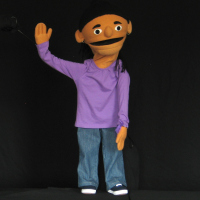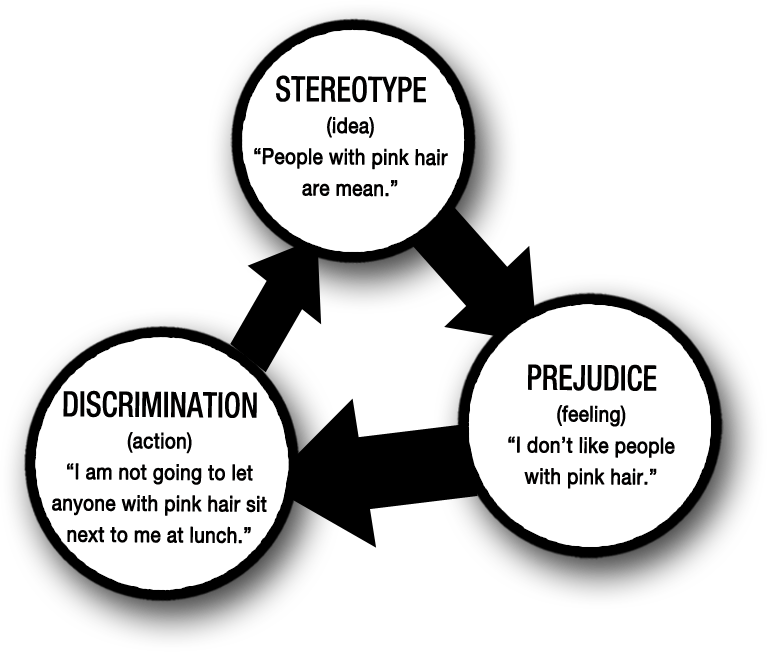Tips To Help Kids Respect and Accept Diversity
Teaching kids to respect and accept diversity can be a challenge. Our Kids on the Block program has made it one of our top priorities and we have become experts at it! Through the art of puppetry, our educational specialists are able to connect with audiences about important, and sometimes difficult, topics. We understand that not everyone will have the opportunity to benefit from our program, which is why Salimah is here with some helpful tips.
 Hi there! My name is Salimah Rahman, I’m 11 years old and I am so proud to be a Muslim and an American. One of my favorite things to do is share about my rich culture and help my friends understand the importance of avoiding prejudiced thinking. It can be tough sometimes to explain, so I’m here to help with some tips!
Hi there! My name is Salimah Rahman, I’m 11 years old and I am so proud to be a Muslim and an American. One of my favorite things to do is share about my rich culture and help my friends understand the importance of avoiding prejudiced thinking. It can be tough sometimes to explain, so I’m here to help with some tips!
- Differences Are Not A Bad Thing – One of the most important lessons in regards to respecting and accepting diversity is we all may appear to be different on the outside, but we are all made up of the same things in the inside. It doesn’t matter if we are an adult or a kid, we all have feelings that can get hurt when we are teased, insulted, or hurt. Helping your child understand that we all have feelings and we all have differences is the cornerstone in guiding our kids to respect and accept diversity.
“What makes you different, makes you beautiful.”
- Embrace Your Differences – Our differences are what make us unique. Let your child know that what sets them apart is something to be proud of and embrace! If your child is being made fun for any reason (their name, beliefs, family arrangement, or physical differences) talk to them about it. Reassure them they are loved and beautiful.
“You can’t control what people think or what they say, what you can control is the way you react to them.”
- Use It As A Learning Opportunity –When your child comes home with a question about someone or something they saw but you don’t know the answer don’t be afraid to tell them. Use it as a learning opportunity for both of you. For example, if your child asks about someone who says they have cerebral palsy (CP), you might not know that in some cases their speech is slowed due to a stiffness in their muscles. So, take this opportunity to learn together!
- I don’t know, but we’ll both find out together!
- Research the topic together – go online, visit your local library, do your research!
- Discuss what you’ve learned.
- Important note: Answering tough questions like, “What’s wrong with them?” can be difficult. A great way to respond to questions like this is, “I don’t think you mean to say what’s wrong with them, you just want to know why they are different from you. Well, he has CP, which stands for cerebral palsy. I don’t know very much about CP but let’s find out together!”
- Set A Good Example – Be mindful of jokes, slurs, implications, and your attitude towards others. Often, children repeat what they hear from their friends and family members even if they don’t understand or know what it means. It is important to confront discriminatory behavior when it happens. Avoiding or ignoring the incident will not make it go away. In fact, it can be interpreted as unspoken approval.
- Reframe – If your child is making prejudicial comments, sometimes the best way to handle the situation is to rephrase it. Take this situation for example:
Billy is at the mall with his mom and sees a man walk by wearing a turban.
Billy: Mom, that man looks funny!
Mom: Why do you think he looks funny?
Billy: He’s wearing a sheet on his head. That’s silly!
Mom: I think you mean you don’t know what it is. That doesn’t mean it’s silly. It’s just different from what you’ve seen. It’s called a turban.
Billy: A tur—ban? What?
Mom: That’s what it is called. A lot of people wear turbans. Turbans are typically worn as a customary headwear (just like you wear caps!). Sometimes it is used for religious reasons, nobility, and sometimes people wear them when they are sick. There are lots of reasons!
Billy: Hmm. That’s neat. Why don’t I have one?
- Know How To Identify Stereotypes, Prejudices, and Discrimination and How to Eliminate the Cycle – It’s okay to notice differences. All of us, in some shape or form, have differences that set us apart. There isn’t anything wrong with noticing differences, what we want to be wary of is forming stereotypes that can lead to hurtful prejudices and discrimination. As we explained earlier, we all have differences in one way or another, our differences are what make us special. Here is a great graphic that demonstrates the powerful cycle.
 “Think about the word prejudice- it comes from pre and judge. Pre meaning before and judge meaning to make up your mind. It’s making up your mind about someone before you get to know them.”
“Think about the word prejudice- it comes from pre and judge. Pre meaning before and judge meaning to make up your mind. It’s making up your mind about someone before you get to know them.”
- Do Not Use The Words “Gay” Or “Retarded”
- Here are few phrases you should teach your child not to say – “That’s so gay,” “Wow, how retarded.” Instead, teach your child to use words that describe how they are feeling such as absurd, foolish, ridiculous, and ludicrous. Use these opportunities to help teach your child new words they can use to expand their vocabulary. Using insensitive words and phrases hurt not only individuals but their family and friends.
- Remember some people have intellectual disabilities. While retardation is not a bad word, when used to describe someone or something you think is bad or stupid it becomes another thoughtless hurtful word. So, please stop using the word “retarded.” It hurts individuals and families of those with intellectual disabilities.
Sometimes we forget we live in a world made up differences; whether language, religion, appearance, beliefs, or our general likes and dislikes, differences are what set us apart. Let’s teach our kids to be respectful and accepting of the people around us!
Want To Know More About the Puppets?
Visit our Meet the Puppets page to learn more.
If you would like the puppets to visit your school, contact us here.


